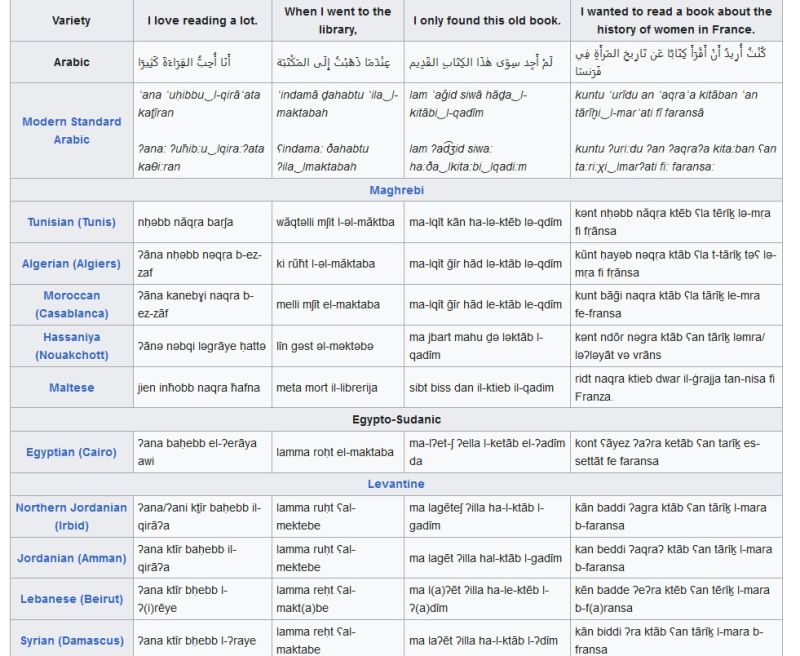How different are the different varieties of Arabic from each other? 스레드 게시자: Thomas Johansson
|
|---|
I am trying to get an idea of how different the different varieties of Arabic are from each other.
Would it be correct to compare them, in this regard, to the different Romance languages which all have developed from Latin?
That is, can we say for instance that the difference between the various "vernacular" Arabic languages (for instance Moroccan Arabic, Egyptian Arabic, San'ani Arabic in Yemen, Sudanese Arabic and Baghdadi Arabic in Iraq, etc.) is similar to that bet... See more I am trying to get an idea of how different the different varieties of Arabic are from each other.
Would it be correct to compare them, in this regard, to the different Romance languages which all have developed from Latin?
That is, can we say for instance that the difference between the various "vernacular" Arabic languages (for instance Moroccan Arabic, Egyptian Arabic, San'ani Arabic in Yemen, Sudanese Arabic and Baghdadi Arabic in Iraq, etc.) is similar to that between the different Romance languages (French, Romanian, Italian, Portuguese, Spanish, etc.)?
And can we say that the difference between, on the one hand, the various vernacular varieties and Standard Modern Arabic is as big as that between, say, French and Spanish, or French and Latin?
[Edited at 2024-02-14 07:51 GMT] ▲ Collapse
| | | | | | | Palestine-Algeria | Feb 14, 2024 |
I was once chatting (in English) over coffee with my Palestinian friend Hala. My Algerian friend Hichem turned up and I introduced them. They chatted for a few minutes in Arabic, and then Hala excused herself because she had to leave.
After she'd gone Hichem said to me, in astonishment "she speaks classical Arabic!" He was very impressed.
From this flimsy evidence I conclude that Palestinian Arabic is grammatically correct and beautiful, whilst Algerian Arabic is more o... See more I was once chatting (in English) over coffee with my Palestinian friend Hala. My Algerian friend Hichem turned up and I introduced them. They chatted for a few minutes in Arabic, and then Hala excused herself because she had to leave.
After she'd gone Hichem said to me, in astonishment "she speaks classical Arabic!" He was very impressed.
From this flimsy evidence I conclude that Palestinian Arabic is grammatically correct and beautiful, whilst Algerian Arabic is more of a dialect.
Hopefully some of our Arab colleagues will clarify.
[Edited at 2024-02-14 12:38 GMT] ▲ Collapse
| | | | | I couldn't tell, but | Feb 14, 2024 |
The best people to answer your question will be our native Arabic-speaking colleagues in the forum.
However, I remember that a colleague and Egyptian project manager I worked with told me that, for example, Moroccan Arabic is more complicated to understand for a native Egyptian Arab, because they use a "mixture" of French and Spanish words along with Arabic, and vice-versa.
On the other hand, Arabic Egyptian and Arabic Lebanese or Palestinian can be mutually intelligible.
... See more The best people to answer your question will be our native Arabic-speaking colleagues in the forum.
However, I remember that a colleague and Egyptian project manager I worked with told me that, for example, Moroccan Arabic is more complicated to understand for a native Egyptian Arab, because they use a "mixture" of French and Spanish words along with Arabic, and vice-versa.
On the other hand, Arabic Egyptian and Arabic Lebanese or Palestinian can be mutually intelligible.
I found this short article interesting:
https://discoverdiscomfort.com/arabic-dialects-maghrebi-egyptian-levantine-gulf-hejazi-msa/ ▲ Collapse
| | |
|
|
|
Arne Krueger (X)
독일
Local time: 23:39
독일어에서 영어
+ ...
| Broader approach | Feb 14, 2024 |
See further historical references:
https://en.wikipedia.org/wiki/Semitic_languages
As to its differences. I was chatting with guy from Georgia, USA, some time ago and we were talking about "minced meat". He apparently didn't understand what it is and asked me why I put mint in my meat... ^^ You see, even English-speaking people have difficulties understanding thei... See more See further historical references:
https://en.wikipedia.org/wiki/Semitic_languages
As to its differences. I was chatting with guy from Georgia, USA, some time ago and we were talking about "minced meat". He apparently didn't understand what it is and asked me why I put mint in my meat... ^^ You see, even English-speaking people have difficulties understanding their own language... (I believe mince actually has Latin origins, but not sure.)
In any event, quite a long way to walk... Hope you enjoy it! ▲ Collapse
| | | |
Thomas Johansson wrote:
I am trying to get an idea of how different the different varieties of Arabic are from each other.
Would it be correct to compare them, in this regard, to the different Romance languages which all have developed from Latin?
That is, can we say for instance that the difference between the various "vernacular" Arabic languages (for instance Moroccan Arabic, Egyptian Arabic, San'ani Arabic in Yemen, Sudanese Arabic and Baghdadi Arabic in Iraq, etc.) is similar to that between the different Romance languages (French, Romanian, Italian, Portuguese, Spanish, etc.)?
And can we say that the difference between, on the one hand, the various vernacular varieties and Standard Modern Arabic is as big as that between, say, French and Spanish, or French and Latin?
[Edited at 2024-02-14 07:51 GMT]
My college professor who was Egyptian told me that in standard Arabic, her first name is pronounced as "Najiwa" (the "j" pronounced as in 'jam') but in her native Egyptian Arabic, it is pronounced "Naghwa" (the "g" pronounced as in 'gone') even though the "j" and "g" part uses the same alphabet.
Same thing could be said for Chinese, maybe.
| | | |
Arne Krueger wrote:
As to its differences. I was chatting with guy from Georgia, USA, some time ago and we were talking about "minced meat". He apparently didn't understand what it is and asked me why I put mint in my meat... ^^ You see, even English-speaking people have difficulties understanding their own language... (I believe mince actually has Latin origins, but not sure.)
mince (v.)
late 14c., mincen, "to chop (meat, herbs, onions, etc.) in little pieces," from Old French mincier "make into small pieces," from Vulgar Latin *minutiare "make small," from Late Latin minutiæ "small bits," from Latin minutus "small" (from PIE root *mei- (2) "small").
From: https://www.etymonline.com/search?q=mince
| | | | |
|
|
|
Arne Krueger (X)
독일
Local time: 23:39
독일어에서 영어
+ ...
...Thanks, Thomas, for the reference. I kind of knew it came from there... And to be honest, wouldn't surprise me if the Latin term was borrowed from the Greeks. But that is clearly beyond my capabilities...
But you can see how language and cultural expansion go hand in hand. It's the same with Arabic, I guess. Expansion of the religion and therefore adoption of language by other tribes...
| | | | To report site rules violations or get help, contact a site moderator: You can also contact site staff by submitting a support request » How different are the different varieties of Arabic from each other? | Trados Studio 2022 Freelance |
|---|
The leading translation software used by over 270,000 translators.
Designed with your feedback in mind, Trados Studio 2022 delivers an unrivalled, powerful desktop
and cloud solution, empowering you to work in the most efficient and cost-effective way.
More info » |
| | Trados Business Manager Lite |
|---|
Create customer quotes and invoices from within Trados Studio
Trados Business Manager Lite helps to simplify and speed up some of the daily tasks, such as invoicing and reporting, associated with running your freelance translation business.
More info » |
|
| | | | X Sign in to your ProZ.com account... | | | | | |












